Paraguay: “We are no longer afraid and we fight against this oppressive system”
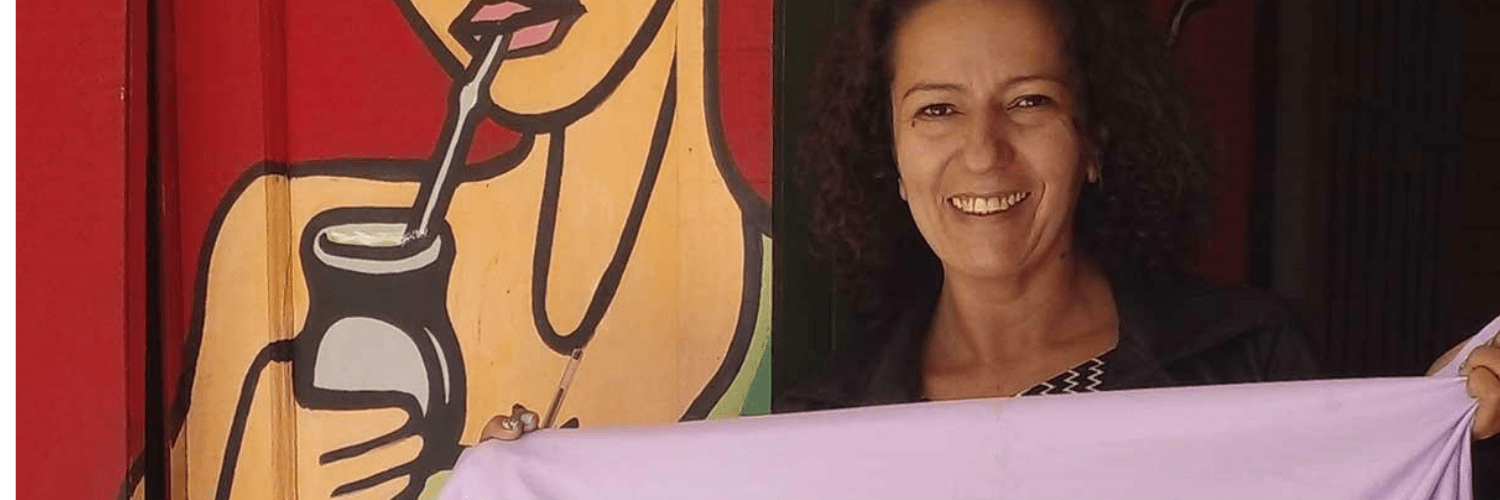
The Organisation of Peasant and Indigenous Women (Conamuri) in Paraguay celebrated 25 years of history and the construction of a popular, rural feminism and food sovereignty. It has a school of agroecology, hundreds of hectares in the hands of women and its own organic yerba mate. This article is an interview by Maria Sol Wasylyk Fedyszak with Alicia Amarilla, national coordinator of Conamuri.
The Organisation of Peasant and Indigenous Women (Conamuri) is a powerful voice in Paraguay in the struggle for food sovereignty, against the advance of agro-toxins, equal rights and a life free of violence, and this year it celebrated its 25th anniversary. What is the scope of action for a popular organisation in a country that has been governed for almost 80 years by the same political party? What are the nuances of indigenous and popular peasant feminism? What progress and challenges have been made in this context? Alicia Amarilla, national referent of Conamuri, answers and takes stock of a quarter of a century of struggle.
Alicia Amarilla is 43 years old and was born in the department of Caaguazú, 180 kilometres from Asunción, and has been a member of Conamuri since the age of 19. The struggle for land is a mark in her life, not by choice but by imposed tradition, from the moment her grandmother was evicted by the Colorado party, like thousands of others, during the time of Alfredo Strossner (military and dictator who was in power from 1954 to 1989). She was also evicted because she was a woman: in Paraguay, until a few years ago, land ownership could only be held by men. If a woman was unmarried and had no older sons, she had no right to the land. Alicia’s grandmother had five daughters. Today she is 95 years old.
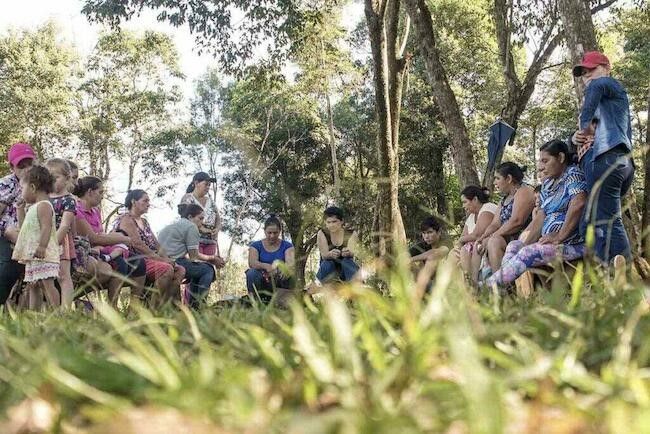
Conamuri was one of the first organisations to denounce agrochemicals in 2003 with the death of Silvino Talavera, an 11-year-old boy who was a victim of agrochemical spraying in Itapúa (300 kilometres from Asunción). At that time, they were discredited by saying that they did not understand the national reality and that they were “crazy”. They were told that agrotoxins were secondary issues. They were also branded as crazy when they proclaimed themselves feminists.
Today, Conamuri is made up of around a thousand women from almost every department. The organisation has a Human Rights Secretariat, a Land and Territory Secretariat and an Agroecological Production Secretariat. Through agroecological production, they make women’s work in the countryside visible and have a school where women and men are trained to raise awareness against the advance of agrotoxins, promoting the rescue and conservation of seeds. They also have community gardens for self-consumption. They promote different campaigns against violence against women, creating networks in the territories to accompany these cases and promote the training of indigenous leaders through their space Escuela India Juliana.
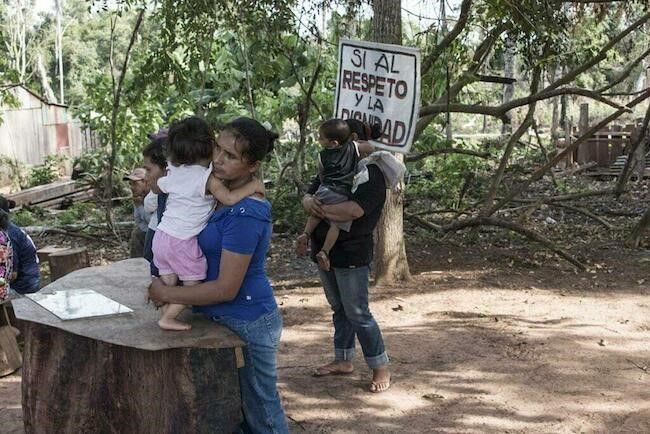
How was the work in these 25 years?
It was up and down. There were difficult moments. First, to be recognised as political subjects. Not only by the government, but also within the social movements themselves. When Conamuri started, there was a smear campaign by our own comrades, who said that we were dividing the forces. Over time, Conamuri was recognised for the real struggle, the struggle from the grassroots, we had large mobilisations and detailed work on food sovereignty. Since 2003, after the death of Silvino Talavera, we began to work against agrotoxics, and I remember that they told us that these were secondary issues, that they were not issues to fight. They said we were crazy, that we didn’t understand the national reality. And after ten years everyone started to fight against agrotoxins. That’s when we started to work with the rescue of native seeds with young people. Then there were 20 or 25 young people working on the campaign at the national level, going to the church, to the community to talk about GMOs when they were just entering the country. Then we started to work on the seed law. And that debate led us to draw up a proposal. We presented a maize defence bill to the Senate. It was rejected and, instead, the big producers introduced the transgenic maize seed law.
What effect did this process have on the organisation?
And throughout this process in Conamuri we matured the issue of agroecology. Then in 2010 we started the School of Agroecology and we opened our premises in Caaguazú. The School of Agroecology had training on gender, agroecological techniques, the history of Paraguay, community history and our history of seeds, which has to do with the close experiences of safeguarding that each family has had. For example, there are families that have been saving a certain type of maize for years. And that is how we were able to establish the issue at the national level.
Who attended the Agroecology School?
When we started we only worked with women, because we are used to producing. Around our little house we planted fruit, vegetables, cassava, everything for our own consumption. What happened is that when we left school we went home and there was a fierce contradiction with our son, with our husband, because the state structure, the Ministry of Agriculture, went to the territory and set up an association of producers and took the whole package (of the transgenic model) and gave courses on the use of agro-toxins for those colleagues who were more permeable to the capitalist production system. So it is much more difficult with men. After seeing this, we began to think about another agroecological school. So the woman who has children comes with her child. And so we opened up one percent for men to participate as well. And so we accompany the family in agroecological production.
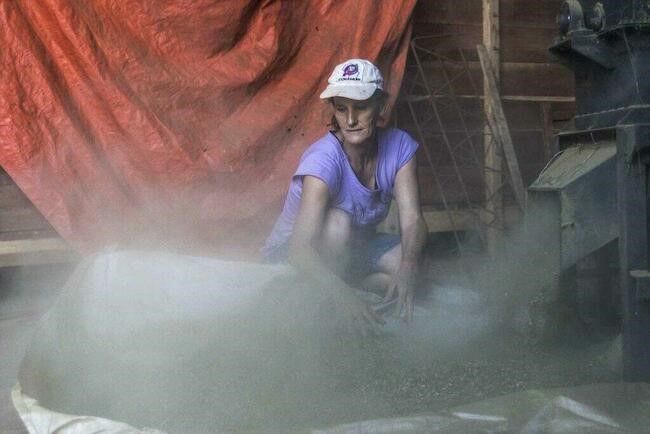
How many people make up Conamuri?
There will be about a thousand of us. From almost all the departments. Because the other organisations have also been disappearing. There is only one Conamuri, thanks to the fact that we don’t get involved in political (party) disputes. Because that is another way of dividing. In the time of Fernando Lugo (president from 2008 to 2012. His mandate broke with the 60-year continuity of the Colorado Party, until he was ousted) other social organisations began to enter the government and there is an economic dispute, or disputes about everything… And they began to demobilise. We also had big problems because one of our comrades, for example, ran for vice-president without consulting the organisation. Then we decided that Conamuri was going to be a trade union organisation. Most left-wing parties have their arm in the social movements. And we don’t want to be the social arm of any party. So what we decided was that Conamuri was going to continue to be a trade union organisation for struggle, for women’s demands, whoever is in government. And I think that saved us at that moment, at that critical moment.
What is it like to be a feminist in this political context?
In a process as difficult as ours and as sexist as ours, there has to be a deeper debate with the grassroots, with the people. Whether we like it or not, women’s votes are still dominated by men. Yes, there is a greater presence of women, there is more movement, stronger mobilisations, more visibility for women’s problems. But in concrete terms, there are still problems with the issue of shared responsibility for childcare. It is still an issue for Conamuri because it is difficult to sustain a national organisation, because the young women leaders, at least when they are young, everything is calm, but when they get married, they stay at home. And when they have children, for example, they can go out less. We still have a long way to go, but we are holding our own.
How do you define feminism in your organisation?
It is not so long ago that we defined ourselves as feminists. Because before in Conamuri we hardly talked about gender. And then in the process we started to talk. We debated from our territory. We have always worked for food sovereignty in the community, in our family. Our village. So why not politicise and make women visible in this, in the issue of agroecological production, in the issue of caring for the seed, we have always saved the seed for sowing. So why not politicise this and make this work we have been doing visible?
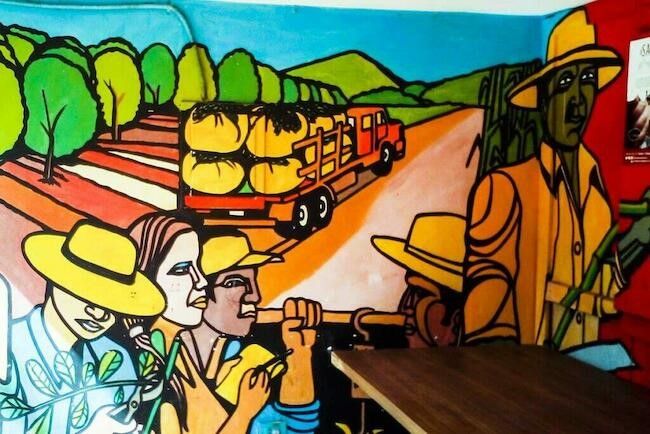
For us, feminism is the feminism of our work. From what we are, from being peasant women or indigenous women, and how we can politicise our work on a daily basis. For example, the kitchen can be for some people a place of oppression for women, but for us it is something else. It is not oppression. In our kitchen there are conversations with other women colleagues, with your friend, with your mother-in-law, with your people, with your daughter making chipaguazú. That’s where you talk about violence. And as well as talking about the recipes, the soup, it is a permanent form of teaching. The kitchen is the place of power for peasant and indigenous women. It is also where men are not present.
Do you feel that some of the agenda of other, perhaps ‘more urban’ feminisms can nourish your struggle?
The “more urban” feminism also makes a contribution for us. We see that for Conamuri, for example, to deal with the LGTB issue, we realise that in our organisation there are also lesbian comrades. So we started to look at the communities. And we started to look at why they have to leave their community to live their lives. Why they can’t be there. Why can’t we look for land for her. Why we can’t produce with it. And why she has to go out to the city. We started to discuss. And on the other hand, the issue of abortion. We started to talk about us, and it had been that everybody had had an abortion. Although it’s not mentioned on that letterhead but they talk about the use of natural medicines or someone says that “I missed 15 days and I took this”. So we started to write prescriptions with the indigenous women and they know a lot more about natural medicine. So, when there is trust and when we talk about natural medicine, many things come out.
Conamuri has the Juliana Indian School, a school for indigenous women, inspired by Juliana, the first woman to rebel against the invaders. One of the main areas of training is indigenous rights, the good life of women and the fight against violence. Indigenous women suffer more violence than peasant women.
And how do you deal with such situations of violence?
We are committed to training. Because it is the only one that gives us freedom. And on the other hand, we create a nucleus of women in the territory. We have at least ten or twelve women with whom we work on the issue of violence, and we build a network of trust so that our colleagues who suffer go to them, whether or not they are members of the organisation, at least to talk about the situation. So that was the way we found to organise ourselves at the territorial level, to protect ourselves, at least to report situations of violence and to accompany the woman who is being abused, going to her house, working there. If she doesn’t go to her husband or if the situation improves or not, we make a commitment, we try to find a way. We don’t agree with the way the Ministry of Women’s Affairs works, which victimises women even more. There is no close accompaniment, but rather a fierce propaganda and then the victim is left again because there is no women’s home where she can take shelter.
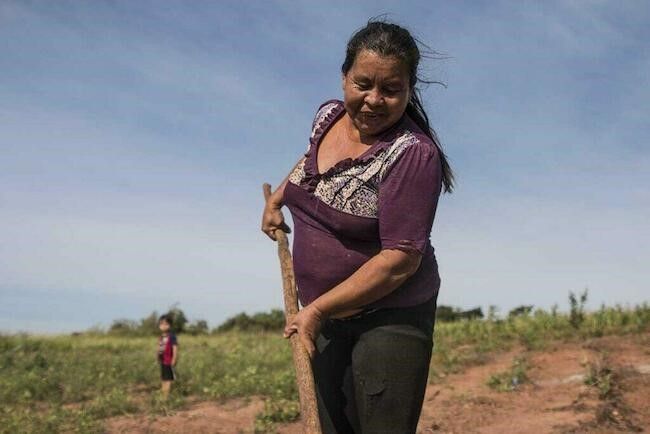
Is it true that two percent of landowners own 85 percent of the land in Paraguay?
It remains so.
You would be in the remaining 15 per cent or less of the territory.
It is the same, because nowadays the countryside is without peasants, without indigenous people, they are in the city. And now that the peasants have practically nothing at all, they don’t have any land, so they start to evict indigenous peoples who are the only ones who have large territories. But today there are also large indigenous organisations against evictions. We accompany landless communities in order to be able to recover a little piece of land, but the advance of agribusiness in the countryside is terrible. Most of us women are landless. We don’t own land. After the fall of Strossner there was an Agrarian Statute that allowed women to be subject to agrarian reform. Before, we could not own land, but only in the name of men. So most of the women don’t have any land, unless it’s by inheritance or something like that. And it is very difficult for a single mother to pay for her land, for example, if they don’t help her, if they don’t give her land.
Do you go around villages to see the effects of spraying?
I am now visiting fumigated schools, we are investigating, it is terrible (Alicia shows a photo of the short distance between a school, without a green barrier, and a crop. The green barrier is the vegetation that is used to stop the effect of agrotoxins) Many schools are next to plantations. There is no living barrier and when they are spraying it is terrible. Impressive. Imagine the children nearby. And the smell is very strong, unbearable. And people have allergies and other health problems.
Do you have a record of diseases caused by pesticides?
We had signed an agreement with a medical school to carry out data collection in a community around soybean crops and other communities that are still protected. And there we realised that in this community there were ten children with leukaemia, people with cancer, with eye problems, skin problems, and there were four or five deaths from cancer. And in another, where there is no soya, there was practically nothing. This gives us to analyse that agrotoxins are really killing people little by little. I live in a place where we are mobilising to stop large-scale agribusiness production from entering, but elsewhere you go to that field and you get dizziness, diarrhoea, the water you drink makes you sick…
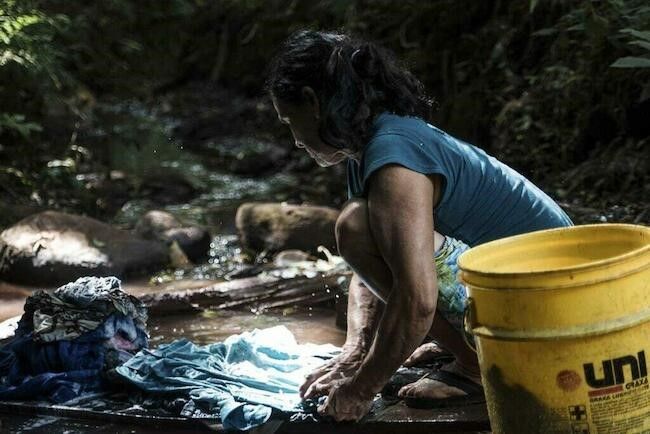
Since 1946, except for the period between 2008 and 2013, the Colorados have ruled the country. How do you interpret this monopoly?
The Colorado Party is a historical dictatorship. It is a super macho structure. It is a violation of all rights. In our whole process of feminist struggle we are inspired by Argentina, and we try to replicate it here as well. That’s why there is also too much retaliation from the state. Here it is forbidden to talk about gender in school. At university it is a word that is not used. By law they took that out. All the progress we had now is starting to go backwards.
Right now the government is presenting a law that implies that, for example, if Conamuri is going to receive resources we have to present a work plan to the government so that they give us some resources and they will decide who continues and who is not fulfilling their objective. And this has half a sanction already. It’s a whole situation for NGOs. They want to put an end to the organisations. We are an advocacy voice and they want to end that now.
Why was the Colorado Party able to sustain itself for so many years?
The issue is that people here don’t know their rights. For example, in a difficult situation you go to a Casa Colorada (of the party), tell them what you need and they will help you. Your relative died and they send an ambulance and bring you here… and the people are left with the feeling that they owe you. In other words, the Colorado Party knows how to work like that, it works from the bottom up. In each community, it has three or four operators who work and who help to address the situation of extreme poverty in which the people live. You go to our hospital, for example, which should be a service, a human right, but here everything depends on the Colorado Party, that’s how it’s organised. The Colorado Party always has a big advantage and people vote for the one who gives them things.
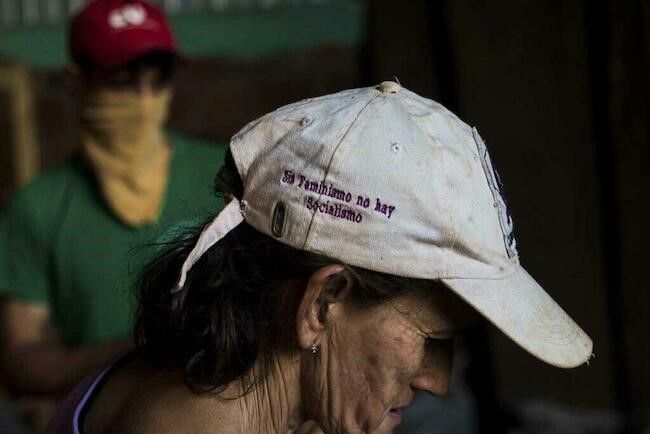
Most of your life was within Conamuri. What is your assessment?
We make history. We believe that in spite of everything we were always present, in the mobilisations, accompanying in cases that others do not dare to do, such as the case of Curuguaty (In 2012, 11 peasants were murdered and 6 policemen died in an eviction). We took out the dead, we buried them. We were threatened. Conamuri suffered a lot because of this situation. We accompanied the six political prisoners very strongly. And at one point the public prosecutor’s office raided our premises. They took all the organisation’s documents. So these are blows and we understand that it was the government, they are striking us a blow for all our daring to support very strong things. I think that many times left-wing parties don’t dare to show their faces or talk about certain things. We are not a party. That also identifies us with the strength we have as women. We denounce, we don’t keep quiet. And we also have that strength that we didn’t have before, for example, to denounce violence, harassment, which we didn’t see before. About ten years ago we defined ourselves as feminists. And that, at least in our social, peasant, indigenous sector, sparked a debate. They say that feminists are what destroys, that they are I don’t know what, the left-wing parties themselves say it, that they are chauvinists, they campaign with that. But for us, our line is very clear, our way. We don’t depend on a man to communicate, we think and we do. There was a time when there was a lot of attack on social networks, but we always came out on top, against the tide, moving forward. And on the other hand, the alliance between women. That in Conamuri. It sustains us. With comrades from other organisations, urban, in different parts, articulating. This permanent alliance that we make also sustains us.
How do you deal with fear?
(Alicia smiles nervously) We are not afraid anymore. We’ve been through a lot of threats. So we don’t give it a thought anymore. I think the solidarity of knowing each other, of talking, of knowing our goal and we fight against this oppressive system. That’s where our arrow is pointed and we’re going to move forward little by little.
At the end of the interview, at the organisation’s headquarters in Asunción, he offers half a kilo of Oñoirú yerba. “It means comrades. It means we are together”, he explains. It is agroecological yerba, produced by Conamuri, which formed an association of producers.
“It is a committee that has been working for many years with yerba de bajo monte. We started working on a small scale and then we got support from the Basque Country, and then we started to set up a factory and that’s where we’re working,” he says. Today it can be found in the markets of Asunción.
In the midst of their work and struggle, to commemorate their 25 years of struggle, they held a mobilisation on 15 October and a fair of agroecological products on 16 October, the Day of Food Sovereignty. In addition, this November 25th they will march together with the compañeras of the city of Asuncion – a demonstration to commemorate their 25 years of struggle.
By Maria Sol Wasylyk Fedyszak
This post is also available in Español.
